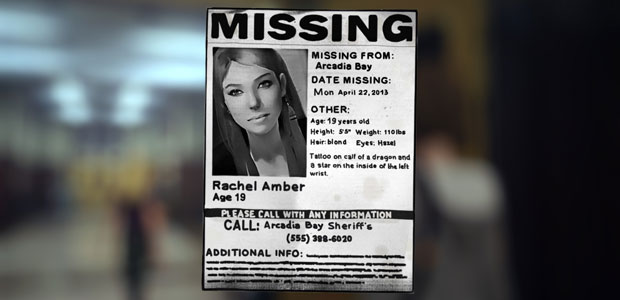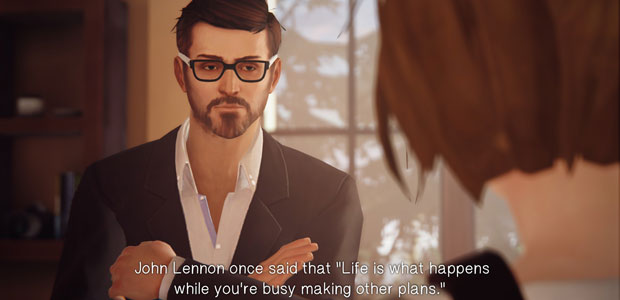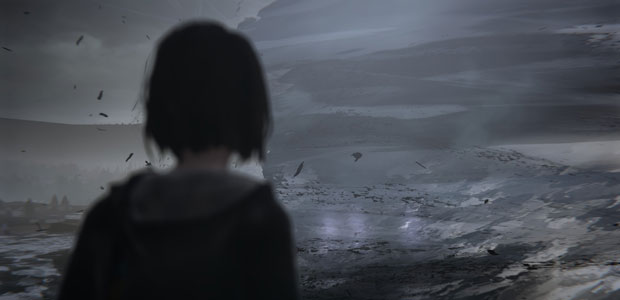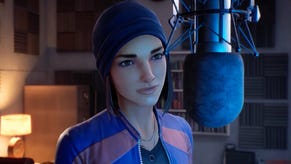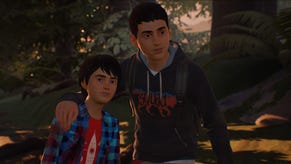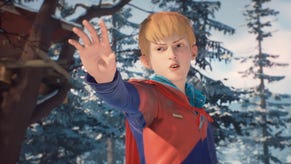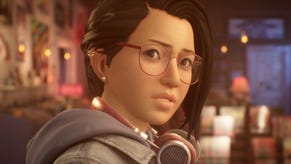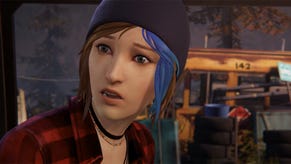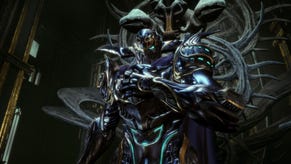Wot I Think: Life Is Strange, Episode One
A gawky teenager of a game
Life Is Strange [official site] is Dontnod's interactive story game told over five episodes. The first – Chrysalis – is out now so Pip took a look. Here's wot she thought:
There was a fanfiction website I used to read as a teenager. I wasn't there for the fanfiction though, I was there for the original fiction subsite. It bristled with stories about misunderstood teens, about girls with a gift for one of the creative fields, who had awkward love lives and friend drama. They tended to fall for boys or girls whose eyes changed colour to match their innermost turmoil like some kind of facial mood ring.
These stories often traipsed deep into Mary Sue territory or wish-fulfilment territory. They were authored by people flexing their fledgling writing muscles within a framework of tropes. Taking them as a bundle they shared an oversaturated earnestness, like emotion could be achieved or amplified through a cocktail of adjectives and pathetic fallacy.
Life Is Strange treads that same path – and this is not an insult.
The game has you take on the role of Max Caulfield (I assume a nod to Catcher In The Rye's Holden Caulfield?); a photography student at Blackwell Academy. After witnessing a fatal incident she discovers she has the ability to rewind time giving her the option of changing her actions to obtain different results. A recurring vision warns of an impending disaster, while a reunion with a former friend sets up a missing person mystery.
Max herself is a familiar character from that teen fiction world. She's got a natural talent for photography, a gawky demeanour and problems at school. Some of these problems are manifestations of general teen angst – they relate to not fitting in, feeling uncertain, not wanting to disappoint. Some have stepped right out of Gossip Girl in their pantomime villainy. For the latter I'm thinking of the spineless principal, the threatening security guard, the rich kid whose background means he gets away with all manner of bad behaviour.
Being able to rewind time is perhaps the ultimate teen fantasy. It gives the ability to redo situations in order to achieve some sort of satisfaction instead of accumulating those excruciating or awkward memories which can prickle and shame well into adulthood. I don't think it's been particularly well implemented in the game, though. By that I mean that there is a lot of language which I think leads you to make particular choices. The game gives a lot of reminders that you can change a decision if you weren't happy with it but from my experience it framed them as Max feeling unhappy with how an event had gone and – it seemed – all but requesting that do-over.
I wondered if that was just because of how I had played and that others would have pursued different routes but I suspect not. The game offers you a Telltale-esque summary at the end which shows how your choices compared with the global player base as well as your friends and so many of those choices had a clear skew towards one answer. I'm concerned that the game angles you towards a correct answer or a correct way of playing Max.
That feeling is compounded when the game raises questions and then refuses to give you options to explore them. There's a moment when you can check a flash drive lent to you by a friend and it contains a folder marked with Max's name. There's an implication that it was left on there by accident and there's an overwhelming impulse to check it out but none of the actions available let you do anything of the sort. It's a moment which spawned a frustration with Max – how could she be so incurious, such a goody goody? The game is supposed to be about choices and it withholds the ability to make some and prioritises others.
I far preferred Chloe. She's the long lost friend – all blue hair and vulnerable rebellion. The characterisation is still wonky – her reaction to reconnecting with someone she thought had abandoned her for years felt particularly off – but she has an energy that Max lacks. Vibrant. Engaging, Honest. Her exchanges with Max impart a lot of backstory and draw connections between disparate story elements but you also get a real sense for who Chloe is, beyond plot exposition, and she's easy to feel affection towards.
The way the game imparts knowledge of how to play is frustratingly slow. A section at the beginning sees you repeatedly being asked a question in class but the game doesn't let you simply apply your existing knowledge from the first scene, it forces you to not know the answer a second time just so it can show you how to respond in the third repetition. I'm also not a fan of the basic interface. You hold down the left mouse button on an item and then drag towards the action you want to perform on it. It doesn't feel intuitive to use and, particularly when trying to enter and exit through doors, your body can obscure the text making it hard to be sure you're even selecting the right area.
Then there are little carelessnesses or odd choices. A diary has looping entries so you can hit next and end up months in the past, dialogue occasionally cuts short as a cut scene interrupts a preceding cut scene, pre-game a warning screen flashes up for far less time than it would take to actually read it. they're not game-breaking but they are jarring and can disturb the rhythm of the story.
The game's art style has an Instagrammy quality. It's like you're viewing Max's life through a golden afternoon sunlight filter. The effect is one of trying to evoke nostalgia for something supposedly happening in the present. Butterflies are a recurring motif and they combine with the visions of a tornado in a none-too-subtle reference to the butterfly effect. You can take pictures of particular objects or people in the game using your film camera, but the ability is limited to those instances. That too felt odd given the whole game has the look of an Instagram-in-waiting. As an aside, I did enjoy Max's gripe about how expensive camera film can be – it's my preferred format but it is prohibitively expensive.
Elsewhere the dialogue can be less natural or knowing. It sometimes has that peppered-with-pop-culture quality which feels more about using cultural touchstones as shorthand for character. Max and her friend Warren have a truly awkward conversation about movies which is more about namedropping cult classics than it is about any real bond or connection. Maybe it's a deliberate point about being image-conscious, or about posturing – I mean, the awkwardness felt authentically teenage – but it could equally have been clunky writing.
I know it sounds like there's a lot of criticism there but episode one is also earnest and gawky and sweet. Life Is Strange itself feels teenaged. It's not realistic and it's not subtle but it taps into a vein of fiction I'd forgotten existed – one which is imperfect, exploratory and full of liminal charm.

